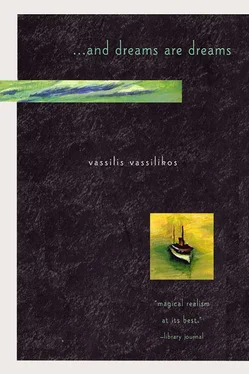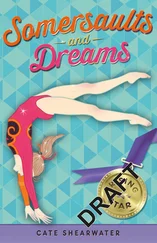“In any case, Otto learned that he was to be king of Greece even before he had turned seventeen. He asked whereabouts that country was, and presumably he was told that it did not yet exist, but that by the time he came of age, which would be in three years, it would have appeared on the map. ‘And what am I supposed to go and do there?’ ‘You will reign,’ said his father. ‘It’s by the sea, and the scenery is beautiful.’ (The young boy loved riding and swimming.) Besides, his father, who was such a debauchee, had given him a complex. Like Kafka. Otto kept writing letters to his father that he never sent. He only sent the ones his tutor dictated to him. And, like Kafka, he died before his father.
“So, Otto arrived, not transformed into a
cockroach like Kafka’s hero Gregor Samsa, but like a bridegroom, with his whole trousseau (he played the piano, he spoke French and a little Greek). One hot number, we would say nowadays. Or a stud. After all, he disembarked in the stud capital, Nafplion. He rode into town on a white horse (and ever since, young girls are said to be waiting for a prince on a white horse).
But at the moment when he was about to speak in his broken Greek, he forgot everything and spoke to the provisional government and the people, who were in a way handing over power, in his native tongue.
Needless to say, nobody understood a word. And that was the way modern Greek history began, in incomprehension. ‘ Hellenen, berufen durch das vertrauender erlauchten grossherzigen Vermittler …’
(Greeks, invited here by the confident, illustrious, and magnanimous mediator…).
“Along with him came Bavarian soldiers who used the national loan for subsistence. At the time, my boy, the Greek tribunals were not able to try a foreign army man. This policy of providing immunity to the foreign military is still in force today. Bavarian jurists came, Bavarian architects, and ladies of the Bavarian court, and all that’s left of them today is a dessert, the famous Bavarian cream.
“This is how a foreign traveler, the Russian painter Vladimir Davidoff (no relation to the cigars of the same name), describes life in Athens in 1834: ‘We are on Ermou Street, near the entrance of the Bavarian cafe Grunen Baum (The Green Tree). We are surprised not only by the poverty of the city, but also by the absolute predominance of foreigners of every nationality over the natives, even in their own capital.
In the street, the only well-dressed people one comes across are Italian shop owners, Bavarian soldiers, government employees, and the members of the diplomatic corps. The only natives we see are manual workers and beggars dressed in their national costume.’
“It was at that time that the old man of the Morea, Theodoros Kolokotronis, decided to retire.
“‘To the extent that I was able,’ he wrote, ‘I fulfilled my duty to my country, and so did my entire family. I saw my country free, I saw what we had all longed for, myself, my father, my grandfather, and all my race, as well as all the Greeks. I decided to go to an orchard I had outside Nafplion. I went there and I stayed, spending my time growing things. It gave me pleasure to watch the little trees I had planted growing bigger.’
“But they didn’t leave Kolokotronis alone either.
They convicted him of being a Russophile, the same way that one hundred years later they convicted the Russophiles of being part of the E.A.M6. It was the Germans now, the Bavarians then. Meanwhile, Bavaria had become part of Germany.”
“And what was Otto like, Grandfather?”
“He was pathetic. Not all there. He wasn’t a bad guy, but he had some kind of cerebral lesion. He couldn’t understand anything they told him. They would take him documents, and he would spend hours studying them, correcting the spelling mistakes and punctuation, and after he had gone over everything, he still hadn’t understood anything. His last word on any subject was, ‘We’ll see.’ As Claude Herve wrote, ‘ I did not understand what he told me and it was obvious that he rarely understood me…. His hair was so flat that it always appeared to be stuck to his head. He was 6 Resistance front during the German occupation. Trans.
in the habit of passing his hand over it all the time to keep it in a state of perfect control. I never once saw a single hair out of place and I imagined that was what he desired of his subjects .’ Fortunately, he would often travel to his homeland and in his absence, his wife Amalia would conclude affairs of state and sign in his place. When he visited Smyrna, he really went nuts.
He saw himself ‘ as the successor of the paleologues. I dream’, he said , ‘of this country becoming big and strong, and I dream of my throne being there, where the last emperor of Byzantium fell. ’ As for Greece, he saw it in the same way modern tourists see it. He liked going on excursions. He liked the ancient ruins. But when the natives saw him accompanied by
Armansberg’s daughters, they thought it was the sultan and his harem, and that Armansberg and his aide-de-camp were the eunuchs. His case resembled that of a mentally handicapped child: you ask it what the time is, and it looks at the hands of the clock, and it tells you the minutes and seconds, but it never tells you what time it is.”
“Here we are,” said the taxi driver. “Isn’t this Othonos Street?”
The narrator got out on the side facing
Constitution Square, and crossed the street to the offices of Olympic Airways.
— 6-
The Captain, Suite: And End
“It was a harsh winter.”
“Which winter was that, Grandfather?”
“The one that marked the end of the first half of the century. It was very cold. Six below and even less.
Even the olive trees were killed by the frost. My great-grandfather’s was the last sailing ship to enter the port of Piraeus. Piraeus was small then, with very few houses. But on that day it was deserted. Outside, the ships of the English fleet had started the blockade. Just when we thought that the following year, 1850, we’d finally get going, a new life would begin, commerce and the economy would get back on their feet. The banker Stavrou wrote: ‘ There are three things missing from Greece: quiet, order, and money. If we wish to be useful, we should bring money. ’ At the time, in the spring of 1849, the great Jewish banker Rothschild was visiting our country. In order to flatter him, Stavrou, the director of the Bank of Greece, had the police ban the traditional burning of the effigy of Judas on Good Thursday. The Christians used to burn Judas out of love for Jesus, because he had betrayed Him. But this Judas who had betrayed the Messiah was the Savior of the Jews. Stavrou was counting on a hefty loan from the international capital that Rothschild represented, and he didn’t want to hurt the banker’s feelings.
“Then the English Secret Service concocted a diabolical plan: they sent their men in the guise of
‘indignant citizens,’ who were supposedly upset by this ban, to storm the house of a Jew, Don Pacifico, who had been born in Gibraltar, was of Spanish descent, and had been a Portuguese citizen before moving to Athens, but who was actually a British national. For the pillaging of his home, Don Pacifico demanded of the Greek state the disproportionately high compensation of 886,739 drachmas, and this demand was fully supported by Lyons, the British ambassador in Athens. The Greek state referred the case to the courts, but Lyons had the British prime minister ask for the opinion of the Council of Jurists of the English Crown. That way, the English had the pretext in their pocket and were simply waiting for the right moment to broach the delicate subject of the
Читать дальше












